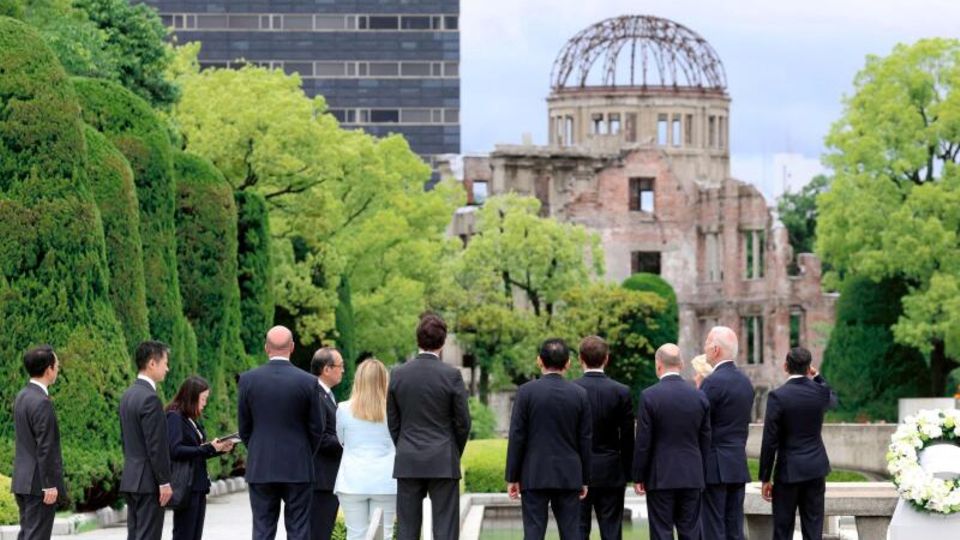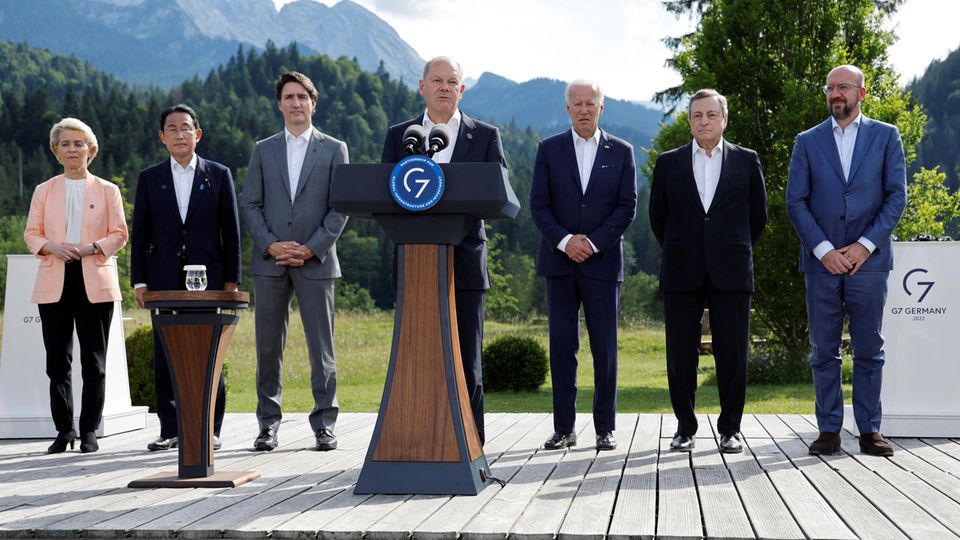questions and answers
The G7 meet in Hiroshima – that’s what today is about
British Prime Minister Rishi Sunak, European Commission President Ursula von der Leyen, Canadian Prime Minister Justin Trudeau, US President Joe Biden and Japanese Prime Minister Fumio Kishida visit the Peace Memorial Park as part of the G7 Summit in Hiroshima
© Stefan Rousseau / Pool / AFP
Never again: in Hiroshima, the G7 states commemorate the devastating consequences of the use of nuclear weapons. The summit of the leading economic powers is aimed at Russia – and China.
From May 19th to 21st the heads of state and government of the G7 will meet in Hiroshima, Japan. Surprisingly, the Ukrainian President Volodymyr Zelenskyj is supposed to take part in person.
Why is the G7 meeting in Hiroshima?
Japan’s Prime Minister Fumio Kishida, as host, has chosen Hiroshima as the venue. With a view to Russia’s war of aggression against Ukraine, the summit at this symbolic location is also intended to commemorate the consequences of the use of nuclear weapons. Russian President Vladimir Putin has repeatedly threatened his country’s nuclear arsenal since the invasion began.
The G7 heads of state and government commemorated the victims of the first atomic bomb dropped on Japan on August 6, 1945 in Hiroshima. At the beginning of their summit, they honored the dead with a wreath-laying ceremony at the memorial in the city, which was almost completely destroyed in the US attack in World War II. Under the simple concrete arch lies a stone sarcophagus containing a register with the names of the 333,907 atomic bomb victims so far (read more information here).
After his arrival in Japan, Chancellor Olaf Scholz said that Hiroshima was a “memorial that we have a responsibility for peace and security in the world”. US President Joe Biden also laid a wreath. Like former US President Barack Obama, who visited Hiroshima Peace Memorial Park in 2016, he did not want to apologize for his country’s atomic bombing at the G7 summit.

The heads of state and government of the G7 countries look at the Peace Memorial in Hiroshima. An impressive memorial that commemorates the first military use of an atomic bomb
© Japan Pool / Jiji Press / AFP
What is this summit about?
The war in Ukraine is a central theme of the deliberations, which last until Sunday. The summit round also wants to provide answers to China’s aspirations to become a great power in the Indo-Pacific region. Above all, US President Joe Biden expects support from his partners in order to put China in its place politically and economically.
In addition to host Japan, the G7 includes Germany, the USA, France, Great Britain, Italy and Canada as well as the European Union. The summit round also wants to discuss the difficult situation of the world economy and questions of climate protection.
Will President Zelenskyy also attend, although Ukraine is not part of the G7?
According to information from Kiev, Ukrainian President Volodymyr Zelenskyy will personally attend the G7 summit in Hiroshima, Japan. Originally it was said that the Ukrainian President would be connected to the G7 summit via video.
Selenskyj is likely to try there to secure further support for his country. Western partners are supporting Ukraine in a large-scale defense against Russia with weapons and ammunition. Kiev has further demands and asks, among other things, for Western-style fighter jets, above all for American-made F-16 aircraft. The USA has so far stood in the way. Pressure from several European countries had recently brought new movement into the discussion.
In view of the war, trips by the Ukrainian President are associated with a high level of risk and enormous security requirements, as well as with careful consideration of whether the war events will allow Zelenskyj to be absent. This applies once again to a long journey halfway around the world, such as to Japan. Participation in the Hiroshima Summit is therefore of particular importance.
What role does Russia play?
The heads of state and government want to paralyze “Russia’s war machine” with new sanctions and to make the war against Ukraine more difficult with further sanctions. The G7 summit on Friday decided to “deprive Russia of the G7 technologies, industrial equipment and services that support its war machine”. Sanctions announced in Hiroshima include export restrictions on goods that are “crucial for Russia on the battlefield” as well as sanctions on companies and organizations that bring war material to the front for Moscow.
Even before the heads of state and government sat down at the table on Friday, the US and Great Britain announced new punitive measures against Russia and its supporters. The G7 countries want to further restrict Moscow’s commodity trade, which is worth billions. Britain announced an import ban on diamonds, copper, aluminum and nickel from Russia.
The USA also announced that it would put together a new package of sanctions. One of the plans is to cut off about 70 companies and organizations from Russia and other countries from US exports, said a government official in Hiroshima.
By Sunday, all G7 countries want to introduce measures to limit the export of rough diamonds from Russia – the world’s largest producer. A corresponding summit declaration is to be decided. “We will restrict trade in Russian diamonds,” said EU Council President Charles Michel on the sidelines of the G7 summit. Referring to the James Bond film Diamonds Are Forever, he added: “Russian diamonds are not forever.”
How do the G7 countries work?
The seven member states take it in turns to hold the presidency. Japan currently holds the presidency, so the meeting is taking place in Hiroshima. Last year it was Germany’s turn, next Italy.
The annual summits of heads of state and government are prepared by meetings of their negotiators and line ministers. Binding resolutions do not come out of the top meeting at the end. In a final document, however, common positions and goals are laid down against which the heads of state and government must be measured. In addition, further papers on special topics are decided upon. Five are planned this year, covering Ukraine, economic security, nuclear disarmament, renewable energy and food security.


